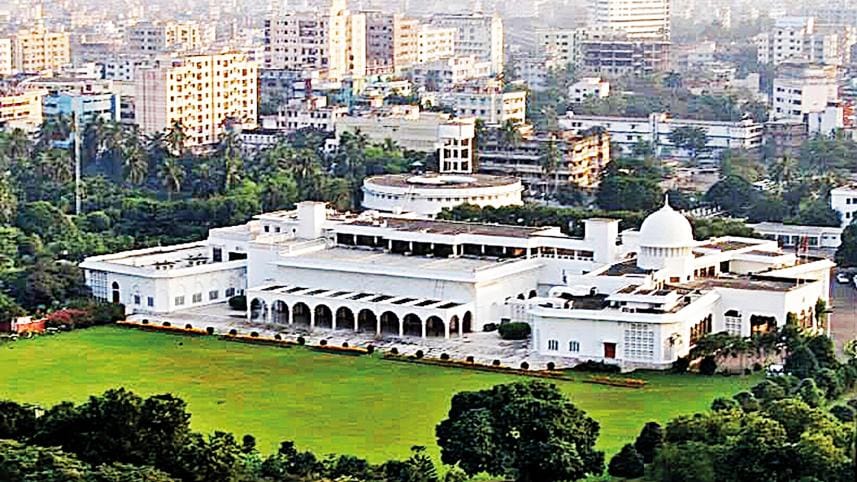The power tango between the PM and the president

Reforms ahead of the national election have been the most consistent pledge of the interim government. One of the core reforms, apart from reviving the caretaker government system, is to bring about a balance of power between the prime minister and the president.
For years, critics have warned that the immense constitutional powers vested in the prime minister risk fostering authoritarianism, with the post of president remaining largely ceremonial, devoid of substantive authority.

The July charter proposes curbing the PM's overarching powers and strengthening the role of the president.
"To prevent the emergence of a fascist regime in the future, there must be a balance of power," said Prof Ali Riaz, vice president of the National Consensus Commission.
Political parties have long stressed the need for a mechanism to prevent the concentration of power in the hands of the head of the government.
"Nearly all institutions are subject to the prime minister's unilateral control. The president is constitutionally bound to act on the advice of the prime minister. In effect, the president holds no independent authority," added Riaz.
Following independence, Bangladesh adopted a parliamentary system of government. However, the country transitioned to a presidential form through the fourth amendment to the constitution in 1975.
The parliamentary system was reinstated in 1991 through the 12th amendment, designating the prime minister as the executive head of the government and the president as the constitutional head of state.
At present, the post of president is largely ceremonial. Real executive authority lies with the PM, who is the most powerful political actor with control over the executive, strong influence over the legislature, and indirect dominance over other state organs.
In reality, the president acts on the PM's advice in almost all matters.
WHAT JULY CHARTER SAYS
The July Charter proposes empowering the president to independently make certain appointments including that of the chairman and members of the National Human Rights Commission; the Information Commission; Bangladesh Press Council; the Law Commission; the Energy Regulatory Commission; and the Bangladesh Bank governor.
However, BNP and several other parties voiced dissent over the appointments relating to the central bank and the energy regulator.
According to the charter, based on recommendations from specific search panels, the president will appoint the chief election commissioner and other election commissioners; ombudsman; chairman and members of the Public Service Commission and the Anti-Corruption Commission, and the comptroller and auditor general. The process will not involve the prime minister.
BNP and like-minded parties issued notes of dissent over appointments based on panel recommendations which, according to them, would be ad hoc and not
accountable to anyone. They called for legislation to ensure a stronger, more transparent framework.
Prof Nizam Ahmed, an expert in parliamentary affairs, said that the curtailment of the PM's powers would not create any problems.
He also welcomed the idea of appointing the CEC and other commissioners through a search panel, with the president making the final selection.
The charter proposes that the president be elected by a simple majority in both houses of parliament, and individuals holding a position in any political party would be ineligible.
The president will have the authority to grant pardon or reduce any sentence but this authority will have to be exercised in line with procedures prescribed by law.
"While some of the president's powers will be expanded, the position will be simultaneously brought under a system of accountability," Ali Riaz said.
PM'S POWERS
According to the charter, most political parties agreed that an individual may serve as PM for a maximum of 10 years.
The charter proposes that an MP would be barred from holding the office of PM and remain party chief at the same time. However, BNP and several like-minded parties issued a note of dissent on the matter.
"The aim here is to create a degree of separation between the party and the government, thereby reducing the concentration of power in the hands of the prime minister," Ali Riaz said.
Until now, the same individual has held the positions of PM, the leader of the House, and the head of the ruling party, exercising unilateral control over the government, parliament, and the party. And there is no limit on the PM's tenure.
Nizam Ahmed noted that the proposed 10-year cap stems from lessons learnt during the tenure of the Sheikh Hasina-led government.
"We need this change," said Nizam, a former teacher at the public administration department of Chittagong University.
He, however, expressed caution regarding the proposal that an individual should not simultaneously hold the post of the PM and serve as the head of a political party.
"In the long run, this could impact party structures… "Without strong political parties, democracy itself may falter," he warned.
Al Masud Hasanuzzaman, a former teacher at the government and politics department of Jahangirnagar University, said, "There are uncertainties about whether the matters noted with dissent will be implemented. If not, the expected balance of power between the president and the prime minister may never materialise.
"Plenty of theoretical ideas are there [in the charter], but what will happen in practice remains to be seen," he said.




 For all latest news, follow The Daily Star's Google News channel.
For all latest news, follow The Daily Star's Google News channel.
Comments